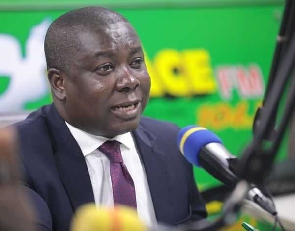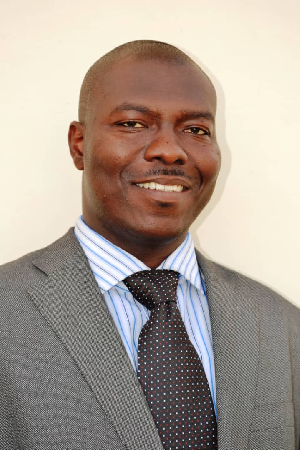- Home - News
- TWI News | TV
- Polls
- Year In Review
- News Archive
- Crime & Punishment
- Politics
- Regional
- Editorial
- Health
- Ghanaians Abroad
- Tabloid
- Africa
- Religion
- Election 2020
- Coronavirus
- News Videos | TV
- Photo Archives
- News Headlines
- Press Release
General News of Wednesday, 28 February 2024
Source: www.ghanaweb.com
Is there a reward for overly criticizing government? - Bawumia's aide takes on top radio host
Dr Gideon Boako, the spokesperson of Vice President Mahamudu Bawumia, has responded to recent editorials by Citi FM morning show host Bernard Avle.
Dr Boako, in a February 19, 2024, post on X, questioned the propriety behind Avle's call for the government to consider a Negative Interest Rate Policy (NIRP).
He said Avle's position was a bit surprising, especially relative to his views on the exchange and interest rates.
"In this country of highly opinionated people, let the Central Bank bring a negative interest rate policy, and you would hear the same people talking as if the country is collapsing," his post read in part.
The Tano North parliamentary candidate for the New Patriotic Party (NPP) went on to give an economic explanation of how unrealistic Avle's position was.
In his concluding remarks, he asked whether criticism of the government was just for the sake of it.
"Let's be measured in our policy prescriptions in our attempt to criticize. Is there a reward for overly criticizing government? I would like to know," Boako asked.
A negative interest rate, according to a 2020 article on the International Monetary Fund (IMF) website, is explained as follows:
In modern times, central banks have charged a positive nominal interest rate when lending out short-term funds to regulate the business cycle. However, in recent years, an increasing number of central banks have resorted to low-rate policies.
Several, including the European Central Bank and the central banks of Denmark, Japan, Sweden, and Switzerland, have started experimenting with negative interest rates —essentially making banks pay to park their excess cash at the central bank.
The aim is to encourage banks to lend out those funds instead, thereby countering the weak growth that persisted after the 2008 global financial crisis. For many, the world was turned upside down: Savers would now earn a negative return, while borrowers get paid to borrow money? It is not that simple.
Simply put, interest is the cost of credit or the cost of money. It is the amount a borrower agrees to pay to compensate a lender for using her money and to account for the associated risks.
Read his full post below:
I listened to my friend @benkoku on many things he considers are ills of government. He may have some points right, but the talk about this government inheriting a cedi-dollar exchange rate of 3.8 in 2017 is a bit surprising. Where is that figure coming from? Also, is he asking the central bank to come up with a negative interest rate policy (NIRP)?. And why?
Yes, we need to get the current levels of nominal interest rates down but the call for a negative interest rate is not the way to go, if indeed we understand what negative interest rate is/means.
In this country of highly opinionated people, let the Central Bank bring a negative interest rate policy, and you would hear the same people talking as if the country is collapsing.
It is instructive to note that while the real interest rate can flexibly fall into the negatives when inflation exceeds normal interest rate, the latter is bounded by zero.
The zero bound nominal interest rate means that to have a negative interest rate is simply saying the nominal interest rate must fall below zero.
The practical effect is that instead of earning interest on your savings, you would rather be required to pay the banks to keep your money for you. In a crude way, negative interest rates impose a tax on your savings instead of earning income on them. Is this something @benkoku will support if it happens in Ghana? Central banks only adopt the policy of negative interest rates as a 'desperate' measure to stimulate spending.
Yes, we need interest rates to go down but the call for stepping beyond the theoretical bound of zero is not something that will ultimately be beneficial to Ghana and its citizens. Let's be measured in our policy prescriptions in our attempt to criticize. Is there a reward for overly criticizing government? I would like to know.
SARA











